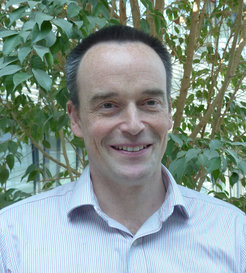In time for new discoveries: Dr. Jonathan Gair joins the Max Planck Institute for Gravitational Physics as group leader
The distinguished data-analysis expert from the University of Edinburgh comes to Potsdam.
At the end of March 2019, Dr. Gair joined Professor Alessandra Buonanno’s department at the Max Planck Institute for Gravitational Physics (Albert Einstein Institute/AEI) in Potsdam. Jonathan Gair will lead a research group on gravitational-wave data analysis and came to the AEI just in time: the LIGO and Virgo gravitational-wave detectors have recently started their third observation run.

“Jonathan Gair perfectly complements our expertise and I am very happy that he decided to join our division at the AEI in Potsdam,” says Alessandra Buonanno, Director of the Astrophysical and Cosmological Relativity division. “He arrived just in time for the new challenges we are looking forward to: the gravitational-wave detectors have started their new observing run O3 with increased sensitivity and many discoveries are waiting for us.”
“I'm very pleased to be coming to the AEI,” says Jonathan Gair. “Full scientific exploitation of gravitational wave observations is only possible with close interactions between experts in source modelling, data analysis and the instruments. The AEI has wide expertise across all areas as well as high-end computational resources. The Institute will be at the forefront of the exploitation of these new observations over the coming years and I am delighted that I will be able to contribute to that scientific effort.”
Analyzing and interpreting gravitational waves
Jonathan Gair will lead a data analysis research group. His research focuses on the development and application of new methods for gravitational-wave data analysis and science exploitation. Very recently, a new computer cluster, Hypatia, of about 9,000 cores has been put into operation at the AEI. Jonathan Gair will use this new cluster to find and interpret gravitational-wave signals and to derive constraints on cosmological parameters, such as the local expansion rate of the Universe (the Hubble constant), from gravitational-wave observations.
Jonathan Gair is also playing a leading role in the development of data analysis tools for the planned space-based gravitational-wave detector LISA (Laser Interferometer Space Antenna). He is assessing the potential scientific impact of LISA, and currently chairs the LISA Science Group which oversees these activities. LISA will be launched in 2034 and will detect low-frequency gravitational waves that cannot be measured by ground based gravitational-wave detectors.












